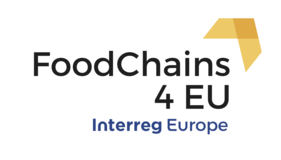The Interreg project - FoodChains 4 Europe has re-united between the 15th -17th of November 2017, the partnership of the project within the specific activities of the second semester, hosted in Bologna, by the Italian partners of this project : Emilia Romagna Region and Universita Catolica Sacre Cuore of Piancenza. The agenda comprised of several study visits in the region that contributed the inter-regional learning even hosted by the university, and that gave the opportunity for the project team and regional stakeholders to become acquainted with Emilia Romagna (Italia) region and its challenges within innovation in the food chain.
Emilia Romagna region has the highest number of PDO”protected designation of origin” and PGI”protected geographical indication in all Italy, likewise being able to introduce in this European certification standard a number of 44 local products. This considerable record has been achieved due to the local associative spirit and climate of mutual trust that has grown in this region among small and big producers. After the Second World War, the region has faced, as all European regions, a shortage and lack of food, so that in order to survive and to create complete food chains from productions to final distribution local producers have set up cooperatives. As an early form of association, with achievements and failures, has set up the premises of functional cooperation among local entrepreneurs in the spirit of fair trade, respect towards the label on the product and the final consumer.
The interregional learning event hosted at the university has given a clear image of the innovation in the food chain made by each region, but also the challenges and issues encountered within this process. Flevoland has a network of local entrepreneurs with a recent history that is keen on extending and creating a local brand for their products, the Plovdiv University has made serious research progress in the utilization of by-products from plants like the residues from rose petals needed for rose oil, Oldham county has been struggling to introduce in the regional strategy the importance food chains while receiving an award at national level for food catering in local schools. Maramures county has presented a local cold pressed oil producer that is reusing raw materials in creating innovative culinary products, while the Italian partners presented their challenges in the packaging industry in the area, constantly searching for more innovative packing products and processes that are environmental friendly.
The two study visits were made at local producers, members of Prosciutto de Parma Consortium and Parmigiano-Reggiano Cheese Consortium. Both products are PDO certified and if the production process is respected, at the end these products are ‘’decorated’’ with the prestigious stamp of the duke of Parma – the ‘’Parma Crown’’. The local producers take pride in the natural process and elements used for these labelled goods, the ham only needs pork meet, salt and time while the parmesan is made only with raw milk, natural fermenting agents and a lot of patience.
Being an important part of the national GDP, both labelled goods are local and national values, so the local producers are strictly controlled and the final products are constantly inspected before reaching the plate of the final consumer.
A common feature that the FC4EU team has encountered within the local producers that had been visited, is that they pay attention to the traceability of each product, this is why the packing process also takes place in the region.
The participating regional stakeholders concluded that these Italian good practices are a rich source of inspiration for their future sustainable development.

